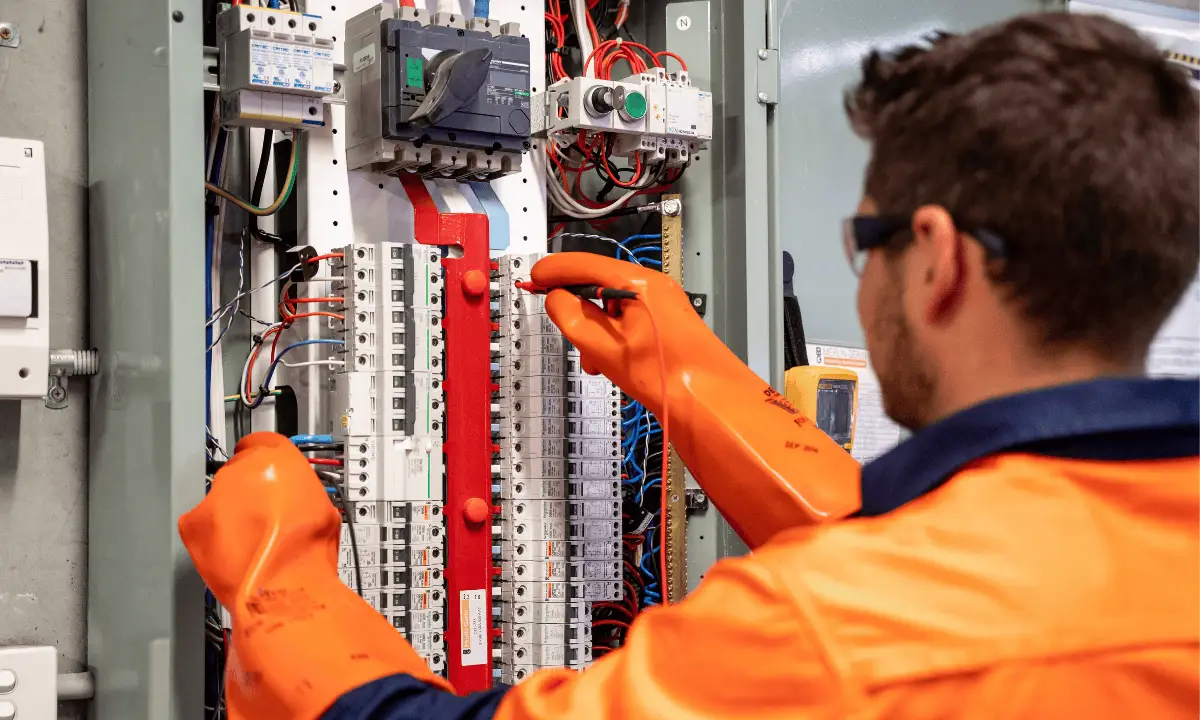It happens in an instant. One sudden jolt and your life changes. If you’ve suffered an electric shock at work, you’re likely dealing with more than just physical pain. The emotional toll, medical appointments, and uncertainty about your job and finances can feel overwhelming. You may be wondering: Can I claim electric shock injury compensation? Am I entitled to electric shock workers compensation?
Unlike more visible workplace injuries, the effects of an electric shock can be complex, delayed, and harder to recognise. At Withstand Lawyers, we understand how disorienting and isolating workplace injuries can be, especially when they’re as serious as electric shocks. This guide is here to help you understand your rights, your options, and how to take the next step forward to claim the electric shock compensation you deserve.

What is an Electric Shock Injury?
An electric shock injury occurs when electrical current passes through the body, interfering with the normal function of nerves, muscles, and internal organs. While some shocks may seem minor at first, the internal damage can be serious, and in some cases, life-threatening.
Recognising Symptoms After an Electric Shock at Work
The symptoms of an electric shock injury can range from mild and temporary to severe and life-altering. Some symptoms are immediate and obvious, while others may appear hours or even days after the incident. That’s why it’s critical to seek medical attention, even if the shock seemed minor at the time.
Below are the most common symptoms experienced after an electric shock at work:
Physical Symptoms
Burns at the entry and exit points of the electrical current
Muscle injuries, spasms, or weakness
Numbness or tingling sensations
Irregular heartbeat or chest pain
Headaches, dizziness, or confusion
Difficulty breathing or shortness of breath
Loss of consciousness in more severe cases
Neurological Symptoms
Seizures or convulsions
Memory problems or trouble concentrating
Nerve damage causing long-term pain or loss of function
Sensitivity to light or sound
Psychological and Emotional Symptoms
Anxiety disorders and panic attacks
Sleep disturbances and nightmares
Depression or emotional changes
Some symptoms may develop slowly, especially neurological or psychological effects. Even if there are no visible injuries, electric current can damage internal organs, nerves, or even the brain.
If you’ve experienced any of these symptoms following a workplace incident, it’s crucial to report the injury, seek professional medical advice, and consider your right to electric shock injury compensation. Early documentation can significantly strengthen your workers compensation claim.
Our team of experienced workers compensation lawyers can offer the advice you need after an electric shock at work. Our fees are covered by IRO, so you pay nothing to make a workers compensation claim after a workplace accident.
Contact us today for a free claim assessment to find out what you may be entitled to.
Common Causes of Electric Shock in the Workplace
An electric shock at work can happen unexpectedly, and often due to conditions that could have been prevented. Understanding the most common causes of electric shock in the workplace not only helps identify liability but also highlights the importance of proper safety measures.
Here are some of the leading causes of electric shock injuries on the job:
Faulty or Poorly Maintained Electrical Equipment
Defective power tools, frayed cords, exposed wiring, or outdated machinery are among the most frequent culprits. Equipment that hasn’t been regularly inspected or maintained increases the risk of electric shock injuries.
Inadequate Safety Procedures
Workplaces that fail to enforce proper safety procedures or don’t provide personal protective equipment (PPE) put workers at serious risk. A lack of clear safety protocols can turn routine tasks into dangerous ones.
Wet or Hazardous Work Conditions
Working in damp environments or near water without the right insulation or safety gear can greatly increase the risk of electric shock. Even small puddles can conduct electricity if proper grounding isn’t in place.
Improper Training or Supervision
Electricity is dangerous, especially for those not properly trained to handle it. Workers unfamiliar with electrical hazards or improperly supervised are more likely to suffer an injury.
Overloaded Circuits and Unsafe Power Usage
Plugging too many devices into one outlet, using makeshift power setups, or working around overloaded circuits can cause short circuits, fires, or electric shock to nearby workers.
If you’ve experienced an electric shock injury from an incident like these, the good news is that NSW workers compensation is available to assist with your recovery. This can include cover for medical expenses, lost wages, and rehabilitation support.
In cases where your electric shock was caused by negligence on your employer’s behalf, you may also be entitled to make a work injury damages claim, depending on the extent of your injury.
Contact us today and speak with our team of workers compensation lawyers to see what electric shock compensation you could be entitled to claim.

What Compensation Can I Claim After an Electric Shock at Work?
If you’ve suffered an electric shock at work, you may be eligible to claim compensation under the NSW workers compensation scheme. This system is designed to support injured workers, regardless of who was at fault, and provides financial and medical assistance to help you recover and return to work.
Here’s what you may be entitled to claim:
✅Medical Expenses
This includes the cost of hospital visits, GP appointments, specialist care, medications, surgery, psychological counselling, and other treatment directly related to your electric shock injury.
✅Weekly Payments (Lost Wages)
If your injury has caused you to take time off work or reduced your capacity to work, you may receive weekly compensation payments to replace lost income. Weekly payments can cover up to 95% of your pre injury average weekly earnings, and weekly payments may continue until retirement age depending on the extent of your injury.
✅Rehabilitation and Support Services
You may also be entitled to rehabilitation and support services, including physiotherapy, psychological counselling, vocational training, and workplace adjustments to help you return to work safely. These services are designed to support both your physical and emotional recovery, while also helping you regain your independence and earning capacity.
✅Lump Sum Payment for Permanent Impairment
If the electric shock results in a permanent impairment, such as nerve damage, chronic pain, or psychological injury, you may be entitled to a lump sum compensation payment. This lump sum compensation amount is based on an assessment of the degree of whole person impairment (WPI), which is carried out by an independent medical examiner once your condition has stabilised.
- For physical injuries: such as nerve and muscle damage, you must receive a Whole Person Impairment (WPI) rating of 11% or more to be eligible for a lump sum payment.
- For psychological injuries: such as PTSD or depression resulting from the accident, your psychological injury must reach a WPI rating of 15% or more to claim.
Every workers’ compensation claim is unique, and the exact amount of compensation you can receive after an electric shock accident will depend on your specific circumstances.
Contact our experienced workers’ compensation lawyers for tailored advice and guidance at no cost to you. Our fees for workers compensation claims are covered by the Independent Review Office (IRO) so you pay nothing out of pocket or out of your settlement to make a claim.
We simplify the entire process and can advise you on what your claim could be worth. Complete the form for a free claim assessment and get your electric shock compensation claim started today.
How to Make a Compensation Claim for an Electric Shock Injury at Work
Seek Medical Support and Diagnosis
If you’ve suffered an electric shock at work, the first and most crucial step is to seek immediate medical attention from your GP or a specialist. Prompt diagnosis not only ensures you receive the right treatment but also lays the foundation for a successful electric shock injury compensation claim under workers compensation. Here’s how your doctor can support your claim:
Diagnose Your Injury
Your GP will assess the extent of your injuries, which may include burns, nerve damage, or psychological trauma, and determine how they affect your ability to work. This medical evaluation is essential to understanding the severity and long-term impact of the electric shock.
Establish the Workplace Connection
To support your workers compensation claim, your doctor must clearly document that the electric shock occurred during your employment. This includes details about the incident, your role at the time, and any unsafe conditions that may have contributed to the injury. Establishing this link is vital for proving your entitlement to compensation.
Obtain a Work Capacity Certificate
Your GP will issue a Work Capacity Certificate, which outlines your diagnosis, your current work limitations, and any treatment or recovery plans. This certificate is a required document when lodging a workers compensation claim for an electric shock injury.
Notify Your Employer
It’s essential to notify your employer as soon as possible after experiencing an electric shock injury at work.
Your employer is then required to notify their workers compensation insurer within 48 hours so you can begin to receive statutory benefits.
Delays in reporting the incident may affect your entitlements, so make sure to provide details about how the shock occurred, where it happened, and any symptoms you experienced immediately after the incident.
Lodge Your Workers Compensation Claim
After notifying your employer about your electric shock injury, the next step is to submit your claim through their workers’ compensation insurer. To strengthen your claim and ensure a smooth process, you’ll need to provide the following:
Completed Workers’ Compensation Claim Form:
This form outlines your condition, how it relates to your workplace, and the compensation you are seeking.Work Capacity Certificate and Medical Reports:
Include a Work Capacity Certificate from your GP along with any relevant medical reports from specialists. These documents must clearly connect your injury to the workplace incident and detail the impact on your health, work capacity, and treatment needs.Relevant Workplace Documents:
Gather any supporting documentation such as incident reports, photos, emails, maintenance logs, or witness statements. This evidence helps confirm the circumstances surrounding the electric shock and strengthens your case for compensation.
By submitting accurate and complete documentation to the insurer, you’re taking a vital step toward securing your electric shock workers compensation entitlements. A well-prepared claim reduces delays and increases your chances of a successful outcome.
Insurer’s Decision
Once you’ve submitted your electric shock workers compensation claim, the insurer will begin assessing your case to determine whether to approve or deny your entitlements. During this process, they may contact your doctor, employer, or other relevant parties to gather further information about how the electric shock at work occurred and how it has affected your health and ability to work.
If your claim is approved, you may be entitled to receive the following electric shock injury compensation benefits:
Weekly Payments
If your injury prevents you from working, you may receive weekly compensation to cover part of your lost income.
Medical Expenses
This includes coverage for medical treatments, hospital care, medications, physiotherapy, and other healthcare services directly related to your electric shock injury.
Rehabilitation Services
Support may include physical rehabilitation, psychological therapy, and vocational training to assist your recovery or help you return to suitable work.
In more serious cases, if your injury results in a permanent impairment, you may also be eligible for a lump sum compensation payment. The level of entitlements you receive depends on the severity of your injuries and the long-term impact on your ability to work.
Has your workers compensation claim been denied? Or are you unsure how to lodge a claim after an electric shock at work? We’re here to help.
At Withstand Lawyers, we offer a free claim assessment to review your situation, explain your legal rights, and guide you through the next steps. Whether you’re dealing with delays, underpayment, or a rejected claim, we’ll fight to ensure you receive the electric shock injury compensation you’re entitled to.
Our legal fees are fully covered by the Independent Review Office (IRO), meaning you won’t pay anything out of pocket to get the help you need. Contact our workers compensation lawyers today and take the first step toward getting your life back on track.

Making a Work Injury Damages Claim After an Electric Shock
If your electric shock at work was caused by your employer’s negligence, such as unsafe work conditions or failure to maintain equipment, you may be entitled to make a work injury damages claim (also known as a common law claim).
A work injury damages claim focuses on holding your employer accountable for failing to provide a safe work environment. This type of claim is separate from standard workers compensation and provides a lump sum payout for your past and future economic loss.
To qualify for a common law work injury damages claim, the following criteria must be met:
Your Whole Person Impairment (WPI) Rating Is 15% or Greater:
Your WPI must be assessed by an Independent Medical Examiner (IME), who evaluates the extent of your permanent impairment. We can assist in organising this assessment to ensure your claim is properly supported.Your Employer Was Negligent:
Negligence occurs when your employer fails to provide a safe working environment, especially when dealing with electrical hazards. In the case of electric shock injuries at work, this could include failing to maintain or inspect electrical equipment, not supplying appropriate personal protective equipment (PPE), allowing unsafe wiring or wet conditions near electrical sources, or not providing proper training and supervision for electrical tasks.A work injury damages claim offers a significant lump sum compensation for the past and future loss of earnings caused by your workplace injury, including those resulting from an electric shock at work due to your employers negligence. However, it’s important to understand that accepting this payout means you will give up your rights to ongoing workers compensation benefits, such as weekly payments and medical expenses.
Because this decision can have lasting financial and legal implications, it’s essential to get the right advice. Our experienced work injury damages lawyers can assess your eligibility, explain your entitlements, and help you decide whether this claim is the best option for your situation.
We offer a free claim assessment, and under our No Win, No Fee policy, you won’t pay any legal fees unless your claim is successful. Contact our team today and let us guide you through the process to maximise your compensation after an electric shock accident at work
Making a TPD Claim After an Electric Shock Injury
If you’ve suffered a serious electric shock at work and your injuries mean you are unable to return to your usual occupation, or any suitable work for which you are reasonably qualified to do, you may be entitled to make a Total and Permanent Disability (TPD) claim through your superannuation.
A TPD claim is separate from your workers compensation claim and can provide a lump sum payment to help support you financially if your injury has permanently impacted your ability to earn an income from any job you have education, training or experience doing.
To be eligible to claim Total and Permanent Disability (TPD) through your superannuation after an electric shock injury, you will generally need to meet the following criteria:
Unable to Return to Work in Your Usual Job
You must be unable to return to your usual job or any other work for which you are reasonably qualified by education, training, or experience.Hold an Active TPD Policy
You must have held an active TPD policy when the electric shock injury occurred or when you stopped working due to the injury. Most super funds provide TPD cover by default, so you may have cover without even knowing.Your Condition is Permanent
Your treating doctors must deem your condition to be permanent and unlikely to improve.
Because TPD definitions and requirements vary between superannuation funds, the right legal advice can help ensure your claim is prepared correctly and supported with strong medical evidence.
Unsure if you qualify? Unsure if you have TPD cover? Our team of TPD lawyers can provide you with a free claim assessment, so you know what your TPD payout could be worth after an electric shock injury. We handle everything on a No Win No Fee basis, meaning you won’t pay any upfront costs to make a TPD claim.
Contact us today to see what you could be eligible to claim after an electric shock injury at work.

Navigating an Electric Shock Workers Compensation Claim with Withstand Lawyers
Making an electric shock workers compensation claim can feel overwhelming — but you don’t have to face it alone. At Withstand Lawyers, we understand the serious physical injuries, emotional trauma, and financial stress that can follow an electric shock at work, and we’re here to guide you through every step of the process.
Here’s why our clients trust us with their electric shock compensation claims:
Decades of Experience
With years of experience handling electric shock injury compensation and other complex workplace injury cases, we’ve helped countless workers secure the full benefits they deserve. Our tailored approach ensures your unique circumstances are understood and addressed for the best possible outcome.
No Out-of-Pocket Costs
The Independent Review Office (IRO) covers all legal fees and disbursements for eligible workers compensation claims in NSW, meaning no hidden costs and zero financial risk when you choose us to make a claim.
Compassionate and Personalised Support
We combine quality legal knowledge with genuine empathy. Our team takes the time to understand how the electric shock injury has impacted your life and your ability to work, providing clear, supportive guidance throughout your claim.
Proven Track Record of Success
From weekly payments and medical expense coverage to lump-sum compensation and work injury damages claims, we’ve achieved life-changing results for clients recovering after an electric shock at work.
Free Claim Assessment
Not sure if you’re eligible for electric shock workers compensation? We offer a free, no-obligation assessment to review your case, explain your entitlements, and help you move forward with confidence.
Choose Withstand Lawyers for dedicated and quality support focused on achieving the best outcome for your claim. Call us on 1800 952 898 or complete our contact form to start your claim today.

Issa Rabaya
• Bachelor of Laws
• Graduate Diploma in Legal Practice
• Approved Legal Service Provider to the Independent Review Office
• Member of the Law Society

Issa Rabaya
• Bachelor of Laws
• Graduate Diploma in Legal Practice
• Approved Legal Service Provider to the Independent Review Office
• Member of the Law Society
Electric Shock Injury Compensation FAQs
If you suffer an electric shock at work, seek medical attention immediately, even if your symptoms seem mild. Electric shocks can cause hidden injuries such as nerve damage, heart problems, or internal injuries that appear later. Report the incident to your employer as soon as possible and ensure it is formally documented for your workers compensation claim.
Yes, an electric shock injury can be the basis for a workers compensation claim in NSW, particularly if it causes ongoing pain, requires medical treatment or surgery, or results in a permanent work restriction. If the electric shock occurred in the course of your employment you may be eligible for compensation. This can include coverage for medical expenses, weekly income payments if you’re unable to work, and a lump sum payment if the injury has caused a measurable permanent impairment.
In NSW, the time limit for making a workers compensation claim is 6 months from the date of the injury or the date you became aware of the injury (e.g. if symptoms developed later due to delayed complications such as nerve damage or cardiac issues).
Yes. In NSW, workers compensation operates on a no-fault basis, meaning you may still be eligible for benefits even if the incident was partly or entirely your fault. However, if your employer’s negligence contributed to the injury, you may also be entitled to a work injury damages claim for additional compensation.
You don’t need a Whole Person Impairment (WPI) assessment to access basic workers compensation entitlements such as medical expenses and weekly income payments. However, a WPI assessment is essential if you’re seeking a lump sum payout for permanent impairment caused by an electric shock at work. In NSW, this assessment is usually carried out once your injury has stabilised, typically around six months after the incident, to ensure the long-term effects are accurately measured.
At Withstand Lawyers, we can arrange a WPI assessment on your behalf to simplify the process. Contact us today to see how we can help with your claim.
Yes, you can. A Total and Permanent Disability (TPD) claim is entirely separate from your workers compensation claim.
If your injury prevents you from returning to work, you may be eligible to claim both workers compensation and TPD. Making a TPD claim will not affect your workers compensation entitlements, and vice versa.
We often have workers compensation clients who are unaware that they also have TPD cover. Contact us today for a free claim assessment to see what you are eligible to claim.
If your claim is denied or you believe you’re not receiving your full entitlements, you have the right to dispute the decision. At Withstand Lawyers, we can review your case, gather additional evidence, and challenge the insurer’s decision on your behalf, at no cost to you, as legal fees are covered by the Independent Review Office (IRO) in NSW. Contact us today to see how we can help make a successful claim after an electric shock at work.




